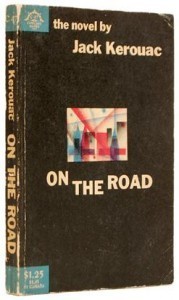Scott Timberg's Blog, page 18
January 28, 2015
The Meaning of The Clash
For the last two weeks I’ve been touring behind my book, doing lots of public-radio interview, and in some cases dueling with people who disagree with me. The concentrated attention has made me think long and hard about my stance and my values.
One of the things I’ve realized is that my politics are an odd cross between Teddy Roosevelt and The Clash. (To be clear, I don’t agree with either the Republican president or the British punks about everything.) The latter is not really a surprise to me; I was crazy about punk rock in high school and college, London Calling may be my favorite album post-Beatles, and one of its songs, “Lost in the Supermarket,” lends its title to my chapter on runaway capitalism and unchecked consumerism.
Here is that great song, with a montage of Clash posters and album jackets.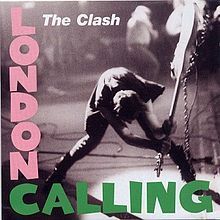
The Sex Pistols represented a different lineage based on consumerism, nihilism, and Warholism. (I loved them at the time but they now remind me of Jeff Koons’s faux-rebellion.)
What set the Clash apart for me was telling the truth, telling it with force (and artistry — their songs post-debut were beautifully crafted), and not letting the bastards win. These are lessons that shaped my point of view profoundly.
January 27, 2015
Culture Crash on the Road
For the last two weeks my book and I have been on the East Coast barnstorming for artists’s rights, the middle class, an honest discussion about digital technology and other subjects. It’s been a blast, I am still reasonably healthy, and I look forward to returning home to California later… today.
Thanks to everyone I’ve met and all who’ve expressed interest in the book and its concern.
January 18, 2015
The Costs of Disruption
WHAT happens when we tear up the past, replace people with bots and culture with content? Those are some of the question on the mind of former New Republic literary editor Leon Wieseltier in his piece “Among the Disrupted.”
He begins this way:
Amid the bacchanal of disruption, let us pause to honor the disrupted. The streets of American cities are haunted by the ghosts of bookstores and record stores, which have been destroyed by the greatest thugs in the history of the culture industry. Writers hover between a decent poverty and an indecent one; they
are expected to render the fruits of their labors for little and even for nothing, and all the miracles of electronic dissemination somehow do not suffice for compensation, either of the fiscal or the spiritual kind. Everybody talks frantically about media, a second-order subject if ever there was one, as content disappears into “content.” What does the understanding of media contribute to the understanding of life? Journalistic institutions slowly transform themselves into silent sweatshops in which words cannot wait for thoughts, and first responses are promoted into best responses, and patience is a professional liability.
This story, from today’s New York Times Book Review, has been floating around for a couple weeks now; in part because I’m a member of the tribe of the disrupted, I’ve been sent it about a dozen times.
I’ve not posted it yet, because I’ve been busy launching my book and leaving for a tour around Culture Crash. But the essay isn’t going away. It’s helping clarify our situation for some people.
January 15, 2015
The Artist in the 21st Century
WHAT has art — and the artist as its maker — come to mean after postmodernism and four decades after Warhol’s emergence? That’s a question Sarah Thornton — a very sharp British sociologist with an interest in visual art — asks in her newish book 33 Artists in 3 Acts.
I’m only partway through Thornton’s book, which is full of smart observations. A few lines from Anna Altman’s BookForum review keep echoing for me:
Contemporary artists, [Thornton] argues. are as devoted to their self-presentation as their artworks, managing their audiences with calculated, guarded gestures. Nothing is unselfconscious in this world. Everything is image.
Thornton tries to get Jeff Koons to talk in ways about something besides PR and platitudes, but can’t nail him down. “Koons’s discourse is so pat that you feel you are in the presence of an actor playing the role of an artist.”
It’s interesting to note that for some of the artists outside the Angl0-US axis, there is more at stake in art than money and image. (China’s Ai Weiwei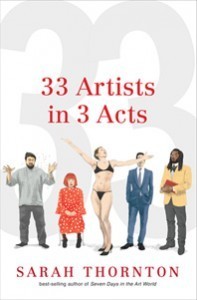 is one of those chronicled.)
is one of those chronicled.)
This book may be even more insightful than her previous Seven Days in the Art World.
January 14, 2015
Culture Crash on Madeleine Brand/ KCRW and Uprising With Sonali
TUESDAY was my book’s pubdate; it included a launch event at the LA Central Library’s ALOUD series that I think went really well. (But who knows?)
I also went on the air with one of California’s great radio figures, Madeleine Brand of KCRW. I’ve been a KCRW listener since I landed in LA 18 years ago. My life has changed in all kinds of ways since then, and I’ve lived in five different places, but I’ve always been an attentive listener of its talk and music programming. So a real honor to be on the station and see the fabled basement.
Our interview, just under 15 mts, is here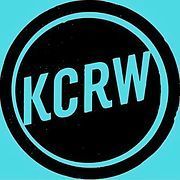 .
.
This week I also appeared on the KPFK show “Uprising with Sonali.” She was great and full of passion and questions about Austin, TX. Here it is.
January 13, 2015
Education, Postmodernism, Etc: Culture Crash on Arts Fuse
TODAY my book, which digs into the issues I touch on in this blog, hits the streets. So I’m very pleased to post an interview with some of the most penetrating questions I expect to see. It’s with the arts journalist William Marx. He starts this way:
Arts Fuse: Why do you believe that the media, universities, and cultural institutions have neglected talking about the crisis for the creative class?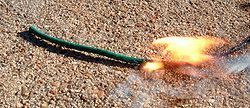
I’ll be posting a bunch of radio on this site as well, including an interview with Madeleine Brand of KCRW’s Press Play, which broadcasts today (Jan 13) at 1230 pm Pacific Time.
January 12, 2015
The Plutocrat’s Art Club
The Germans may have a word for it — things that seem inevitable but are stomach-turning nonetheless. That’s the way I feel about the fact that the very rich are amassing lavish art collections and finding tax shelters for them. They call these tax shelters “museums,” but don’t let the rest of us in. It’s the latest in the strategy by the financial class — many of whom were bailed out with our tax money a few years ago — to socialize the risk and privatize the gain.
Here’s how a New York Times story – “Writing Off the Warhol Next Door” — describes it:
Thanks in part to the skyrocketing value of art and the growing number of collectors who buy it as an investment, private museums — sometimes in out-of-the-way locations and with strictly limited public access — have proliferated in the last decade. While these jewel-box museums can house extraordinary work and offer a small group of art lovers an unusual viewing experience, critics wonder whether taxpayers are helping subsidize wealthy collectors’ multimillion-dollar purchases with little public benefit in return.
And at a time when concerns about inequality have heightened criticism of government policies that favor the wealthiest sliver of society, these tax breaks have come under sharper scrutiny.
A lot of these people — the hedge fund guys, for instance — pay less in taxes than you do. This reminds me of the scandal of for-profit colleges, most of which are subsidized by your tax dollars. 
If you’ve ever doubted Elizabeth Warren’s assertion that the game is rigged, I urge you to read this piece — and weep.
January 10, 2015
“In Praise of Gatekeepers”
ONE of the subjects that makes the disruption boys’ hearts race is the idea that technology will get rid of the gatekeepers — those record-store clerks and publishing-house editors and journalistic critics who just get in the way of the pure, frictionless working of capitalism. If you own a company — esp a tech company that feeds on other people’s creative output — it’s great news is you can remove a layer of employees. (Thus, you’re not paying the creatives, and you’re no longer paying the middlemen.)
This makes hard-headed economic sense — why not let an app or algorithm do everything? — but it’s a disaster for the culture. (You’re talking about removing the human beings who’ve chosen to work around books and music and art because they love it.) If it’s all automated, we have almost no creative class.
What this loss means is the subject of a new Slate piece by legendary editor Daniel Menaker.
These moves are at odds with Amazon’s objective to “disintermediate” the connection between writers and readers. Right now, the principal intermediaries between writers and readers continue to be publishing companies, large and small. They make their choices, pay more or less for them (usually less), more or less support them (usually less), hope that they have good bets and good luck in the casino that is publishing. In my judgment, there are between 20 and 30 editors and publishers in New York who—along with experienced and discriminating publicists, marketers, and sales reps—have over the decades regularly and successfully combined art and commerce and, in the process, have supported and promulgated art. They are in fact the main curators of our life of letters. They have somehow survived the grinding—tectonic—friction between creativity and business and made a go of both. They are cultural heroes, actually.
As an analysand and an armchair analyst, I can’t help suspecting that whether they consciously know it or not, people like Jeff Bezos and the New Republic’s Chris Hughes want some of that. Well, they can’t have it.
A piece well worth reading.
January 9, 2015
How Do We Save Journalism?
FILE under the law of unintended consequences: Because journos pride themselves on being disinterested observers without bias or investment — the old “objectivity” business — they are reticent to stand up for their own peers and profession. I found this out the hard way when I lost my job, and every editor I asked about a first person piece told me no one cared unless I wrote about how a layoff was the best thing that ever happened to me.
One of my favorite pieces yet provoked by my upcoming book, Culture Crash, comes from an LA-based urbanist who suggests that scribes need to plant a flag and take this crisis seriously. Josh Stephens’s piece, on Huffington Post, takes off from my book this way:
While great, brave journalists are still going undercover, reporting form the front lines, and digging up dirt that puts bad guys in jail and preserves democracy, we as a profession have been terrible at preserving ourselves. I can’t help thinking of the stereotypical stoic, cigar-chomping editor: put the paper to bed, have a Scotch, and wait for the next day’s mess. That’s a fine way to cover news but a lousy way to gain support for a noble profession…
Journalists are supposed to be objective and unbiased. But the one thing we can’t expect to be unbiased about is journalism itself. So, with the 2014 holiday season on the wane, I have made myself a promise for 2015. This year, my gifts, be they for birthdays, housewarmings, or next Christmas, are going include subscriptions. Every other journalist, and aspiring journalist, should pledge to do the same.
I don’t have the whole thing figured out and neither does Stephens. But this is a step in the right direction. This whole piece is worth reading — and I’m grateful to Stephens for getting riled up. More of us need to if this field is gonna live to see tomorrow.
January 8, 2015
Culture’s Perfect Storm: CC on the Radio
WHAT do recent changes in technology, economics and social norms mean for the art, culture and the creative class? These are the topics that drive my book, Culture Crash, and they’re subjects I discussed with the Jeff Schnechtman, the Napa, CA-based radio host whose show is called Specific Gravity. Here it is.
I may never get such a good batch of questions that engage with the key questions of my book. I tend to be groggy early in the morning, but this may be good listening for those who think and read about these themes.
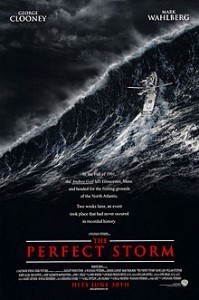 Overall, I was especially impressed with his efforts to put today’s crisis in historical perspective. It’s impossible to understand without that.
Overall, I was especially impressed with his efforts to put today’s crisis in historical perspective. It’s impossible to understand without that.
Scott Timberg's Blog
- Scott Timberg's profile
- 7 followers


